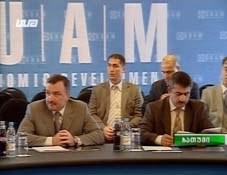GUAM summit wraps up in Batumi
By Mikheil Svanidze
Wednesday, July 2

Presidents of three of the member states—Georgia, Ukraine and Azerbaijan—attended the summit, along with the presidents of Poland and Lithuania.
The fourth member, Moldova, was represented by its interior minister. The country’s president has expressed doubts over the direction the regional alliance is headed.
At the summit Azerbaijani President Ilham Aliyev said the past year had shown the organization operates as an “effective international organization.”
“GUAM member countries cooperate actively and help each other at various international organizations,” he added according to ITAR-TASS news agency.
Ukrainian President Viktor Yushchenko stressed the importance of energy projects in the organization.
He also discussed the launch of the Kerch–Poti–Batumi ferry route which is “at the final stage of preparation” according to his website.
“All these and the other agreements show that…we have a clear plan of what we want to offer to our states, our nations and to the whole community,” Yushchenko said.
In his speech Georgian President Mikheil Saakashvili underlined the importance of friendship and cooperation between member states and the invited guests.
That cooperation is vital for Tbilisi, which seeks international support against what it says is Russian annexation of its separatist enclaves.
Saakashvili spoke of Russia’s moves in the breakaway region of Abkhazia, drawing a comparison with the appeasement of Germany before the outbreak of World War II.
“Georgia is in a bad state. There are attempts to repeat the Munich scenario with regard to Czechoslovakia,” he said in a reference to the 1938 Munich Agreement that paved the way for Germany to annex Czechoslovakian territory.
“We express our hope that no new Munich, division of Europe into spheres or division of territories and reshaping of the borders will happen,” Saakashvili added.
Also discussed at the summit was a pipeline project that could bypass Russia in delivering oil to Europe.
The Odessa–Brody–Gdansk pipeline currently runs north to south, bringing Russian oil to tankers in the Black Sea.
Some countries would like to see the flow reversed allowing Caspian oil to be delivered to Ukraine and onto the rest of Europe.
Mikheil Jibuti, head of the analytical department at Georgian branch of Azerbaijan’s state oil company said it was too early to talk about the details of the project.
The Odessa–Brody–Gdansk pipeline is another point of contention between Moldova and other GUAM members.
In a March interview with Russian newspaper Kommersant Moldovan President Vladimir Voronin said his country had received little benefit from its GUAM membership. He pointed in particular to it not being included in the regional pipeline project.
“There were discussions about the construction of the Odessa-Brody-Gdansk oil pipeline [when GUAM was being set up]. But when I looked at the route [of the planned pipeline], it bypassed Moldova,” he said.
On the day the summit drew to a close, Moldovan Parliamentary Speaker Marian Lupu said GUAM has little appeal for Moldova as it is too focused on political issues.
“[Moldova] was especially interested in economic issues [when GUAM was set up], and these have now been placed on the backburner,” he said.
Representatives from the Czech Republic, the United States and Japan were also in Batumi.
Ukrainian President Yushchenko said Japan is planning to invest around USD 200 million in GUAM transport and tourism projects, according to the news agency UNIAN.
The leaders of the GUAM member states in attendance signed a joint declaration pledging future cooperation.
“GUAM efforts will be directed at further deepening integration processes and enhancing economic potential of the Member States,” it reads.
Georgia has assumed the rotating chairmanship of the organization for 2008–2009.
